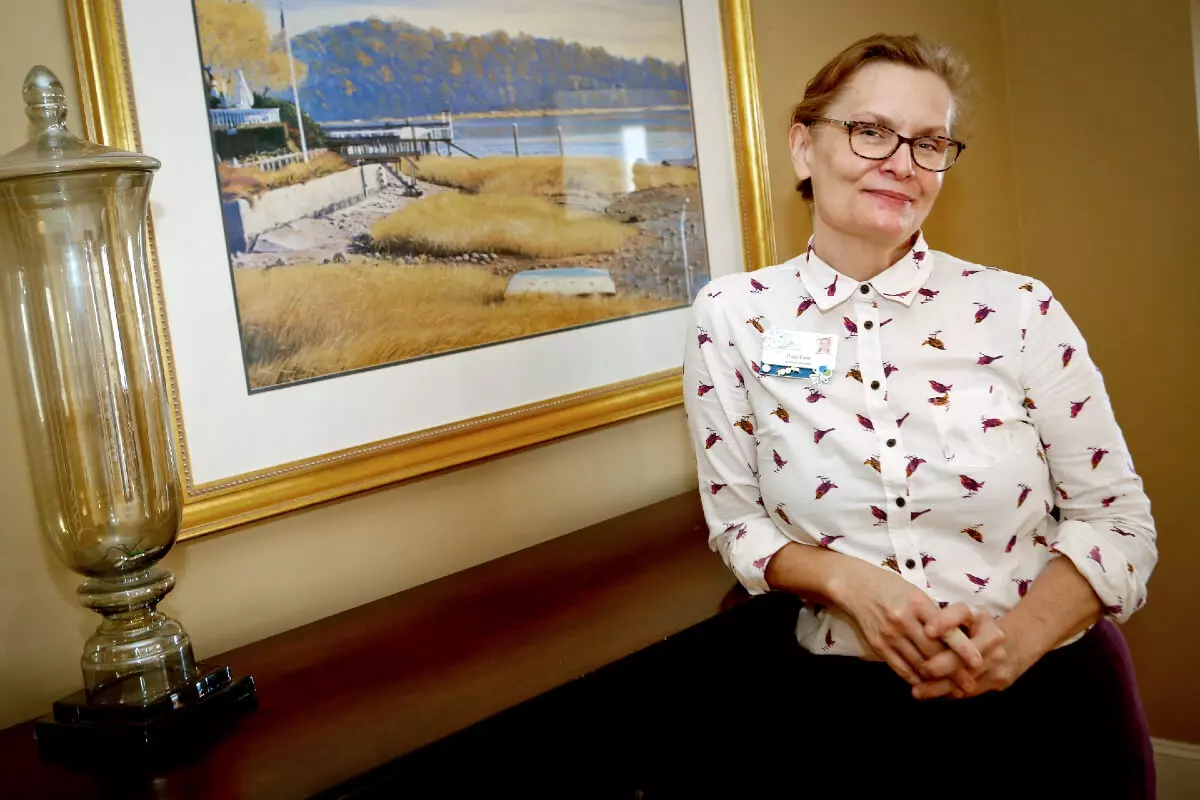How to Transition a Loved One into a Memory Care Community
Pam Fain is a Programming Assistant at Academy Point at Mystic in CT, a Benchmark Assisted Living and Mind & Memory Care community.

In 2009, my mother was officially diagnosed with Alzheimer’s disease. We knew it was coming. She showed all the classic signs. First, we moved her in with me and I quit my job in a nursing home to care for her full time. She helped me with the kids, and we got to spend so much quality time together.
But there came a point when my house was no longer safe for her. She’d be up at all hours, leaving the house and getting lost. I knew it was time to move her into a community that could provide her with a safer environment and services for her needs.
Here’s some advice as someone who’s experienced both sides of the transition experience—as a client and as a senior living professional.
Questions to ask when considering a memory care community
Make sure to visit a number of different communities to compare what services and options are available, along with proximity and cost.
At each place, interact with the staff and ask about the experience there. Ask what their typical day looks like. Watch how they interact with residents. Are they just getting through the workday? Or are they passionately involved with the residents they’re caring for?
As an elder care specialist, here’s what I would ask:
- How is the staff trained and what specialized training do they undergo for dementia?
- How many staff per how many residents?
- How do they keep residents from wandering?
- What exercise programs do they offer for different abilities?
- Ask to try the food and see a menu for the week.
- Have a staff member walk you through the monthly activities calendar.
- What do they do to keep residents feeling helpful and productive?
- What’s the laundry and amenities situation?
- How do they manage medication?
- Do they have physicians or other healthcare providers who provide services on-site at the community?
- Find out if there are spirituality options relevant to your loved one’s beliefs.
- What are the company values?
- How do they go about determining if someone is a right fit for their community?
Empathy is one of the most important foundations of memory care. Alzheimer’s can be incredibly scary to those experiencing it. There’s a lot we can do to help our loved ones feel at ease and enjoy their days. If the community’s staff are good at what they do, they’ll be able to answer all your questions—and probably ask some of their own.
Transitioning past fear into memory care
Moving to a new place can be scary for anyone and add to that the confusion and memory mismatches that often comes with dementia. The idea of leaving behind everything that’s familiar and moving to a new community of strangers can make those with dementia especially anxious.
Trust me, I’ve been there.
When I first visited Academy Point at Mystic for my mother, I was a nervous wreck. But the staff I talked with were professional and patient. They treated me with empathy and asked questions about my mother that put my heart at ease.
And then came the tricky part. I knew there was no way my mother would go for the transition. She’d miss her grandkids. She’d be lonely. Bored. She wouldn’t be happy. How do we even get her here?
What the staff did for me that day, the way they handled my stress and anxiety, is something I’ll never forget. And I offer the same advice to anyone worrying about their own parent’s transition into memory care. Honestly, it’s one of the reasons I eventually decided to work at Academy Point.
Without hesitation the Academy Point staff suggested this simple solution:
Each morning, you’ll invite your loved one to visit “friends” at the community. After you get them introduced, settled in and the activities begin, you’ll excuse yourself for a few hours to run some errands, do some work, etc.
In the afternoon, you’ll meet your loved one in the common area and take them home, asking how they spent the day. Repeat that as needed—generally two weeks works fine—until they are familiar with the community and the idea of being there.
Then a morning will come when you’ll bring them for the visit as usual—but this time you’ll pack their overnight bag and invite them to spend the night with their new friends, while you take care of some things. When you say goodbye, remind them you’ll be back the next morning.
Then you can visit each morning or any time after.
That’s the process that worked for my mother. And let me tell you: the peace of mind I felt watching her smoothly transition with everyone rallying around her reminded me why I love working in memory care so much.
The experience at Academy Point was so touching that I too was inspired to join the Benchmark family. Each day, I facilitate daily programs for our residents, such as gardening and social hours, that cultivate our residents’ passions and their connections with others.
For two wonderful years my mother enjoyed her days in Academy Point’s Mind & Memory Care, until she passed away in 2016—and it all started with that empathetic transition.


